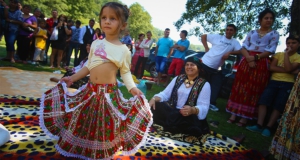Romani people have faced oppression in the forms of lack of access to housing, education, employment, medical care, self determination, and in some places, slavery, for several hundred years. Many countries segregated Romani people, placing them in ghettos with walls separating them from the rest of the city, or banning them from entering cities. Romani youth were,
and still are in some countries, placed in schools separated from non-Romani children. Sometimes Romani children have been placed into schools for mentally disabled children, regardless of their abilities. Many Romani women have been forcibly sterilized, and there have been extensive efforts to prevent interracial marriages. For example, racist rumors have circulated historically that children of such interracial marriages were “more dangerous” than other Romani people.
In 1417, the first anti-Romani law was written in Germany, which banned them from cities and forced them out. Many more places began following suit. Pope Pius V banned Romani people from the realm of the Holy Roman church in 1568. In 1633, Phillip IV of Spain declared that Romani people were not a true ethnicity, merely Spaniards who had created a new language. Romani as a language was banned across Europe and Romani people were forced to either leave or assimilate. This all culminated in the Porrajmos, the Romani Holocaust under Adolph Hitler.
The word porrajmos is an ugly word for the ugliest part of Romani history, meaning “The Great Devouring.” Many Romani elders who survived it or were alive during it hesitate or refuse to say the word out loud. At that time, Nazi German scholars published works such as “The Gypsy Question” to promote segregation and discrimination against Romani people. Heinrich Himmler specifically wrote a decree titled “The Struggle Against the Gypsy Plague” which reiterated the idea that children of interracial relationships were
more dangerous than “pure blooded” Romani people. He also issued criteria for biological and racial background checks going back three generations, not unlike the “One Drop Rule” experienced in the United States for evaluating the “racial” backgrounds of Black and Indigenous people. This should come as no surprise for those who know that Adolph
Hitler created his concentration camps after learning about Native reservations in the United States. White supremacist institutions and states learn from each other and replicate each others’ practices.
One can not celebrate the triumphs of Romani people without also celebrating and honoring the USSR, the first place to liberate Romani people. The USSR gave legal protections to Romani people, guaranteed housing and employment, ended segregated schools and placed a special emphasis on the preservation of cultural traditions. For all previously oppressed nationalities, the USSR worked to preserve and advance the cultures of of these nationalities within their borders, including the full inclusion of many different languages. The Romani language was given a written alphabet, which allowed Romani children to be taught in their own language and helped preserve their cultural customs while ending the longstanding issue of extremely high rates of illiteracy.
The USSR also allowed Romani playhouses and theaters to be built. Music, dancing and plays are common Romani customs, partially due to the lack of a written language for so many centuries. Thus by allowing Romani people to openly display their cultural arts, they were able to preserve and share their culture with outsiders. Romani people reported far less individual discrimination as they became more accepted and protected within the Soviet Union.
Since the counterrevolution of the USSR, Romani people have begun to face higher rates of discrimination again, especially seen in the form of hate crimes and deportations. Romani people have some of the highest rates of illiteracy, poverty, hunger, infant mortality, human and sex trafficking and imprisonment. As rightwing nationalist groups take power in countries such as Ukraine and Poland, Romani villages are being raided and burned, with Romani people being chased out of towns. Every year France deports roughly 10,000 Romani people to Romania or Bulgaria, and often times, those people are not even from those countries and do not speak the language, or even the same dialect as the other Romani people there.
Romani camps and villages are often raided and light-skinned Romani children kidnapped; their parents accused of stealing the child from a European family. These children are sometimes adopted by European families. Sometimes these children are instead kidnapped for sex trafficking or human trafficking as domestic “servants,” a modern spin on slavery. These are practices that have been used against other colonized nations such as Indigenous and Black people, often by the same bourgeois states.
Many non-Romani people believe that nomadism is normal and traditional for Romani people. However, the culture places an emphasis on hygiene and cleanliness, in a physical sense and spiritual sense. These two states are meant to live in harmony to support each other, and one cannot be spiritually clean if one is not physically clean. There are many cleaning rituals relating to food preparation, bathroom amenities and personal hygiene. Nomadism makes these rituals particularly difficult, with lack of access to water and personal space. Romani people do not travel by virtue of the culture but because of laws that do not allow them to stop, whether those laws are specifically anti-Romani, or whether they are laws to uphold private property.
Romani liberation is part of the liberation of all colonized and oppressed nationalities. Centuries of discrimination, enslavement, and ethnic cleansing have scattered us across the globe. But slowly, even after the counterrevolution of the USSR, we are coming together to fight for liberation. Capitalist states will say the reasons for Romani oppression are “complex” and too difficult to fix because they know that fixing these issues means destroying the current capitalist state. Liberation for any member of the working class is never possible under capitalism, and as history has shown, the Romani people will only gain true liberation under socialism.


